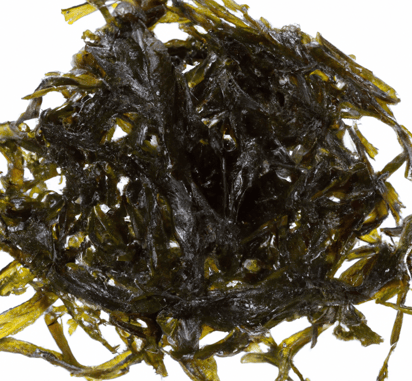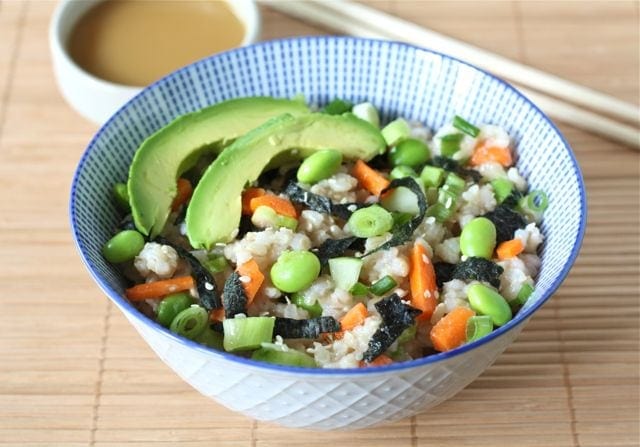Seaweed: Important Facts, Health Benefits, and Recipes
Explore the health benefits of seaweed, its history, and delicious ways to incorporate this nutrient-packed superfood into your daily diet with our ultimate guide.

Nutritional Facts
1 sheet
Amount per serving
Calories
5.4
Carbohydrates
1.1 g
Fat
0 g
Protein
1.1 g
Saturated Fat
0 g
Sodium
0 mg
Fiber
1.1 g
Sugar
0 g
Best Seaweed Recipes
-

-

-

-

-

-

-

-
:max_bytes(150000):strip_icc()/Pokehoriz-cc31584cea004d7b84593a5f6fb4972d.jpg)
-
![Korean Beef Skewers Recipe Image]()
-
-
![Kimbap (Korean Sushi Rolls) Recipe Image]()
-
![Shoyu or Soy Sauce Ramen With Chicken Broth Recipe Image]()
-
![Tekkamaki Tuna Sushi Roll Recipe Image]()
-
![Kappamaki (Cucumber Sushi Roll) Recipe Image]()
-
![Futomaki Recipe (Fat Rolled Sushi With Vegetables) Image]()
-
![Korean Rice Cake Soup (Duk Guk) Recipe Image]()
-
![Bibimbap with Bacon and Kimchi Recipe Image]()
-
![Bukkake Udon (Japanese Cold Noodles With Broth) Recipe Image]()
-
![Classic Cold Soba Recipe Image]()
-
![Cold Soba Noodles With Kale, Avocado, and Miso-Sesame Dressing Recipe Image]()
-
![Kimbap (Korean Seaweed Rice Rolls) Recipe Image]()
-
![Seafood Ramen With Squid Ink, Mussels, and Salmon Roe Recipe Image]()
-
![Kimchi Fried Rice with Sautéed Squid and a Poached Egg Recipe Image]()
-
![Korean Anchovy Knife-Cut Noodle Soup (<em>Myeolchi Kal Guksu</em>) Recipe Image]()
-
![Japanese Mentaiko Spaghetti (Pasta With Spicy Cod Roe and Butter Sauce) Recipe Image]()
-
![Miso-Soup-Flavored Popcorn Recipe Image]()
-
![Makizushi (Sushi Rolls) Recipe Image]()
-
![Japanese Pork Fried Rice Omelette With Okonomiyaki Sauce (<em>Omurice</em>) Recipe Image]()
-
![Miso <em>Tori Paitan</em> Ramen (Creamy Chicken Broth Ramen) Recipe Image]()
-
![Nantucket Scallop Ceviche, Blood Orange Sauce From 'Daniel' Image]()
-
![Oyakodon Recipe Image]()
-
![Ripe's Toasted Nori Edamame with Garlic-ChileOil Recipe Image]()
-
![Quick Kimchi Ramen With Shiitake Mushrooms and Soft-Cooked Egg Recipe Image]()
-
![Tamago Kake Gohan (Japanese-Style Rice With Egg) Recipe Image]()
-
![Yaki Udon With Shrimp Recipe Image]()
-
-
![Japanese Oyakodon Recipe: A Chicken and Egg Rice Bowl Image]()
-
-
![Karashi Mentaiko (Spicy Cod Roe) and Spinach Spaghetti Image]()
-
![Easy California Roll Recipe Image]()
-
![Chicken Rice Balls (Onigiri) Recipe Image]()
-
![Hiyashi Chuka or Japanese Cold Noodle Recipe Image]()
-
![Recipe for Okaka Onigiri Rice Balls Image]()
-
![Spicy Tuna Roll Recipe Image]()
-
-
![Japanese Sushi Roll (Makizushi) With Canned Tuna Image]()
-
![Okonomiyaki (Osaka-Style Japanese Pancakes) Image]()
-
![Norimaki Mochi (Rice Cake, Sweet Soy Sauce, Seaweed) Image]()


:max_bytes(150000):strip_icc()/__opt__aboutcom__coeus__resources__content_migration__simply_recipes__uploads__2016__07__2016-07-11-Beef-Skewers-5-b86b77996c8d4ed98c47661fbbe90f28.jpg)
:max_bytes(150000):strip_icc()/kimbap-korean-sushi-rolls-2118795-Hero_01-2453c846edd1449ab87c26761be72064.jpg)
:max_bytes(150000):strip_icc()/quick-shoyu-ramen-2031288-hero-01-c1f652d8d2bd4f25b32a3f4d6e6d8b37.jpg)
:max_bytes(150000):strip_icc()/tekkamaki-suchi-roll-recipe-2031512-hero-01-aebef3951d3947a5af1e5e939743167a.jpg)
:max_bytes(150000):strip_icc()/kappamaki-2031506-hero-01-edfa59cf5ee34f3cab4d5921e80ef54c.jpg)
:max_bytes(150000):strip_icc()/what-is-futomaki-and-how-do-you-make-it-2031507-hero-01-1de0a6a6ca6042579a545ae3f30d8ab4.jpg)
:max_bytes(150000):strip_icc()/korean-rice-cake-soup-duk-gook-recipe-2118935-hero-01-184dfa2d315f448bb5e420a30aa2c829.jpg)
/__opt__aboutcom__coeus__resources__content_migration__serious_eats__seriouseats.com__recipes__images__2013__03__20130318-245123-dinner-tonight-bibimbap-bacon-kimchi-spinach-2-primary-2e99d1b21be44c5daee6f682051fb5e7.jpg)
:max_bytes(150000):strip_icc()/__opt__aboutcom__coeus__resources__content_migration__serious_eats__seriouseats.com__recipes__images__2016__08__20160719-bukkake-udon-2-2a336be307ae451586895e225b218f29.jpg)
:max_bytes(150000):strip_icc()/classic-cold-soba-recipe-hero-290164d6d6114f338d513eb6da032ae8.jpg)
:max_bytes(150000):strip_icc()/__opt__aboutcom__coeus__resources__content_migration__serious_eats__seriouseats.com__recipes__images__2014__09__20140828-soba-kale-salad-yasmin-fahr-1-9909fe3ad81648c89ec0e19cfd8b9d41.jpg)
:max_bytes(150000):strip_icc()/__opt__aboutcom__coeus__resources__content_migration__serious_eats__seriouseats.com__2020__01__20200122-gimbap-vicky-wasik-24-f5ed1075f35846a29e0812ee053a1bf8.jpg)
:max_bytes(150000):strip_icc()/__opt__aboutcom__coeus__resources__content_migration__serious_eats__seriouseats.com__recipes__images__2014__10__20141023-halloween-ramen-vicky-wasik-3-4096c9624052409d967e63f12b7defc5.jpg)

:max_bytes(150000):strip_icc()/__opt__aboutcom__coeus__resources__content_migration__serious_eats__seriouseats.com__2020__01__20200122-kal-guksu-anchovy-noodle-soup-vicky-wasik-5-1c28bf4c794c49f9bc7e0ba2cad61346.jpg)
:max_bytes(150000):strip_icc()/__opt__aboutcom__coeus__resources__content_migration__serious_eats__seriouseats.com__recipes__images__2017__03__20170210-mentaiko-spaghetti-vicky-wasik-9-5d5739b6dbe54a5bb042e5d7cd0fe705.jpg)
:max_bytes(150000):strip_icc()/__opt__aboutcom__coeus__resources__content_migration__serious_eats__seriouseats.com__recipes__images__2015__01__20150126-popcorn-flavors-2-daniel-gritzer-03-4c73bae3e92a4f37adc236c741fe0f3e.jpg)
:max_bytes(150000):strip_icc()/__opt__aboutcom__coeus__resources__content_migration__serious_eats__seriouseats.com__images__20100712-sushi-maki-10-3f6ecafda9524d34bbc3349db3cf56ba.jpg)
:max_bytes(150000):strip_icc()/SEA-QiAi-okonomiyaki-omurice-japanese-fried-rice-omelette-pork-recipe-hero-78a790a70d1f48588245fc4b6e7af38a.jpg)
:max_bytes(150000):strip_icc()/__opt__aboutcom__coeus__resources__content_migration__serious_eats__seriouseats.com__2018__11__20181113-homemade-ramen-dark-broth-miso-tori-paitan-vicky-wasik-13-e5acfa2f8a1447648b130a41ed7d5b0e.jpg)
:max_bytes(150000):strip_icc()/__opt__aboutcom__coeus__resources__content_migration__serious_eats__seriouseats.com__recipes__images__2014__02__20140203-281933-cook-the-book-nantucket-scallop-ceviche-with-blood-orange-sauce-6b4662c570ea47bf966f9f57148d01e6.jpg)
/__opt__aboutcom__coeus__resources__content_migration__serious_eats__seriouseats.com__recipes__images__2012__02__20120219oyakodonlow610-cc95cabb385e4f24b72b20e008a70f3e.jpg)
:max_bytes(150000):strip_icc()/__opt__aboutcom__coeus__resources__content_migration__serious_eats__seriouseats.com__recipes__images__2012__04__20120410-201232-toasted-nori-edamame-31378589a96a4859b8c82443baa53c6c.jpg)
:max_bytes(150000):strip_icc()/__opt__aboutcom__coeus__resources__content_migration__serious_eats__seriouseats.com__recipes__images__2014__10__20141007-quick-kimchi-ramen-daniel-gritzer14-ab70850477554808ab3f70b4eff8904e.jpg)
:max_bytes(150000):strip_icc()/__opt__aboutcom__coeus__resources__content_migration__serious_eats__seriouseats.com__recipes__images__2016__04__20140416-tamago-kake-gohan-recipe-14-e339a32c00a749a69c8734671068dbdf.jpg)
:max_bytes(150000):strip_icc()/__opt__aboutcom__coeus__resources__content_migration__serious_eats__seriouseats.com__recipes__images__2014__01__20140106-279332-dinner-tonight-yaki-udon-shrimp-0a112dc57fb64e4db9a2a7612309e311.jpg)
:max_bytes(150000):strip_icc()/oyakodon-2031341-hero-01-59d3f5315ed64053a145df49081df1b4.jpg)
:max_bytes(150000):strip_icc()/Mentaiko-Pasta-Casa-DellAlbero_Moment_Getty-56a541875f9b58b7d0dbecf4.jpg)
:max_bytes(150000):strip_icc()/91641088-56a541023df78cf772875849.jpg)
:max_bytes(150000):strip_icc()/Chicken-Rice-Balls-57b934285f9b58cdfd3a455d.jpg)
:max_bytes(150000):strip_icc()/hiyashi-chuka-recipe-2031218-hero-01-3c718c9fd8f342a8b4f62ee8905eaf21.jpg)
:max_bytes(150000):strip_icc()/okaka-onigiri-recipe-2031327-hero-02-6e71f7d32c5342849afae4da0ede106c.jpg)
:max_bytes(150000):strip_icc()/spicy-tuna-roll-2031509-hero-01-5b99a53a83e343a68c1849e26c61a19e.jpg)
:max_bytes(150000):strip_icc()/tuna-salad-sushi-roll-2031511-step-Hero_1-54ce74f3cd40401fb855765eac31dce9.jpg)
:max_bytes(150000):strip_icc()/japanese-okonomiyaki-recipe-2031053-hero-01-293512c5a3754df18ce39f32b9a5c0fa.jpg)
:max_bytes(150000):strip_icc()/Norimaki-Mochi---1-56a541673df78cf77287599b.jpg)